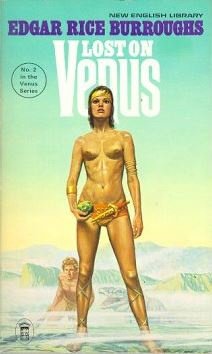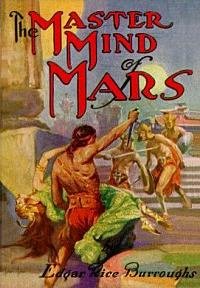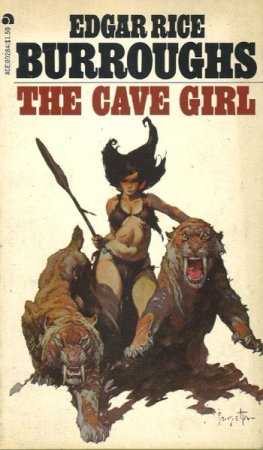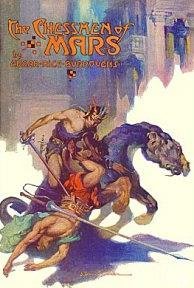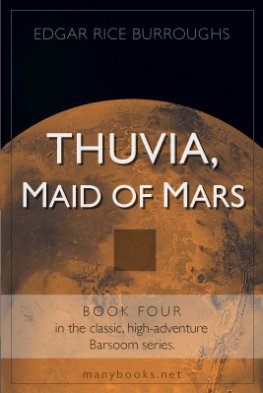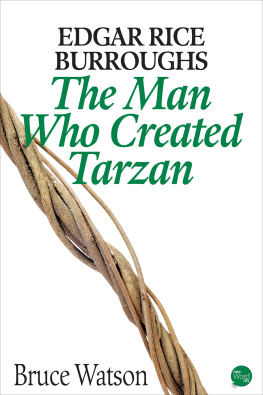Edgar Burroughs - Tarzan and the City of Gold
Here you can read online Edgar Burroughs - Tarzan and the City of Gold full text of the book (entire story) in english for free. Download pdf and epub, get meaning, cover and reviews about this ebook. genre: Adventure. Description of the work, (preface) as well as reviews are available. Best literature library LitArk.com created for fans of good reading and offers a wide selection of genres:
Romance novel
Science fiction
Adventure
Detective
Science
History
Home and family
Prose
Art
Politics
Computer
Non-fiction
Religion
Business
Children
Humor
Choose a favorite category and find really read worthwhile books. Enjoy immersion in the world of imagination, feel the emotions of the characters or learn something new for yourself, make an fascinating discovery.

- Book:Tarzan and the City of Gold
- Author:
- Genre:
- Rating:3 / 5
- Favourites:Add to favourites
- Your mark:
- 60
- 1
- 2
- 3
- 4
- 5
Tarzan and the City of Gold: summary, description and annotation
We offer to read an annotation, description, summary or preface (depends on what the author of the book "Tarzan and the City of Gold" wrote himself). If you haven't found the necessary information about the book — write in the comments, we will try to find it.
Tarzan and the City of Gold — read online for free the complete book (whole text) full work
Below is the text of the book, divided by pages. System saving the place of the last page read, allows you to conveniently read the book "Tarzan and the City of Gold" online for free, without having to search again every time where you left off. Put a bookmark, and you can go to the page where you finished reading at any time.
Font size:
Interval:
Bookmark:
Tarzan and the City of Gold
Edgar Rice Burroughs
CHAPTER ONE SAVAGE QUARRY
Down out of Tigre and Amhara upon Gojam and Shoa and Kaffa come the rains from June to September, carrying silt and prosperity from Abyssinia to the eastern Sudan and to Egypt , bringing muddy trails and swollen rivers and death and prosperity to Abyssinia .
Of these gifts of the rains, only the muddy trails and the swollen rivers and death interested a little band of Shiflas that held out in the remote fastnesses of the mountains of Kaffa. Hard men were these mounted bandits, cruel criminals without even a vestige of culture such as occasionally leavens the activities of rogues, lessening their ruthlessness. Kaficho and Galla they were, the off scourings of their tribes, outlaws, men with prices upon their heads.
It was not raining now, and the rainy season was drawing to a close, for it was the middle of September. But there was still much water in the rivers, and the ground was soft after a recent rain.
The Shijtas rode, seeking loot from wayfarer, caravan, or village; and as they rode, the unshod hoofs of their horses left a plain spoor that one might read upon the run.
A short distance ahead of them, in the direction toward which they were riding, a hunting beast stalked its prey. The wind was blowing from it toward the approaching horsemen, and for this reason their scent spoor was not borne to its sensitive nostrils, nor did the soft ground give forth any sound beneath the feet of their walking mounts.
Though the stalker did not resemble a beast of prey, such as the term connotes to the mind of man, he was one nevertheless, for in his natural haunts he filled his belly by the chase and by the chase alone. Neither did he resemble the mental picture that one might hold of a typical British lord, yet he was that, too-he was Tarzan of the Apes.
All beasts of prey find hunting poor during a rain, and Tarzan was no exception to the rule. It had rained for two days, and as a result Tarzan was hungry. A small buck was drinking in a stream fringed by bushes and tall reeds, and Tarzan was worming his way upon his belly through short grass to reach a position from which he might either charge or loose an arrow or cast a spear. He was not aware that a group of horsemen had reined in upon a gentle rise a short distance behind him where they sat in silence regarding him intently.
Usha the wind, who carries scent, also carries sound. Today, Usha carried both the scent and the sound of the Shiftas away from the keen nostrils and ears of the ape-man.
The circumstances that brought Tarzan northward into Kaffa are not a part of this story. Perhaps they were not urgent, for the Lord of the Jungle loves to roam remote fastnesses still unspoiled by the devastating hand of civilization, and needs but trifling incentive to do so.
At the moment, however, Tarzan's mind was not occupied by thoughts of adventure. He did not know that it loomed threateningly behind him. His concern and his interest were centred upon the buck which he intended should satisfy the craving of his ravenous hunger. He crept cautiously forward.
From behind, the white-robed Shiftas moved from the little rise where they had been watching him in silence, moved down toward him with spear and long-barrelled matchlock. They were puzzled. Never before had they seen a white man like this one, but if curiosity was in their minds, there was only murder in their hearts.
The buck raised his head occasionally to glance about him, wary, suspicious. When he did so, Tarzan froze into immobility. Suddenly the animal's gaze centred for an instant upon something in the direction of the ape-man; then it wheeled and bounded away. Instantly Tarzan glanced behind him, for he knew that it had not been he who had frightened his quarry, but something beyond and behind him that the alert eyes of Wappi had discovered. That quick glance revealed a half-dozen horsemen moving slowly toward him, told him what they were, and explained their purpose. Knowing that they were Shiftas, he knew that they came only to rob and kill-knew that here were enemies more ruthless than Numa.
When they saw that he had discovered them, the horsemen broke into a gallop and bore down upon him, waving their weapons and shouting. They did not fire, evidently holding in contempt this primitively armed victim, but seemed to purpose riding him down and trampling him beneath the hoofs of their horses or impaling him upon their spears.
But Tarzan did not turn and run. He knew every possible avenue of escape within the radius of his vision for every danger that might reasonably be expected to confront him here, for it is the business of the creatures of the wild to know these things if they are to survive, and so he knew that there was no escape from mounted men by flight. But this knowledge threw him into no panic. Could the requirements of self-preservation have been best achieved by flight, he would have fled, but as they could not, he adopted the alternative quite as a matter of course-he stood to fight, ready to seize upon any fortuitous circumstance that might offer a chance to escape.
Tall, magnificently proportioned, muscled more like Apollo than like Hercules, garbed only in a lion skin, he presented a splendid figure of primitive manhood that suggested more, perhaps, the demigod of the forest than it did man. Across his back hung his quiver of arrows and a light, short spear; the loose coils of his grass rope lay across one bronzed shoulder. At his hip swung the hunting knife of his father, the knife that had given the boy-Tarzan the first suggestion of his coming supremacy over the other beasts of the jungle on that far-gone day when his youthful hand drove it into the heart of Bolgani the gorilla. In his left hand was his bow and between the fingers four extra arrows.
As Ara the lightning, so is Tarzan for swiftness. The instant that he had discovered and recognized the menace creeping upon him from behind and known that he had been seen by the horsemen, he had leaped to his feet, and in the same instant strung his bow. Now, perhaps even before the leading Shiftas realized the danger that confronted them, the bow was bent, the shaft sped.
Short but powerful was the bow of the ape-man; short, that it might be easily carried through the forest and the jungle; powerful, that it might send its shafts through the toughest hide to a vital organ of its prey. Such a bow was this that no ordinary man might bend it.
Straight through the heart of the leading Shifta drove the first arrow, and as the fellow threw his arms above his head and lunged from his saddle four more arrows sped with lightning-like rapidity from the bow of the ape-man, and every arrow found a target. Another Shifta dropped to ride no more, and three were wounded.
Only seconds had elapsed since Tarzan had discovered his danger, and already the four remaining horsemen were upon him. The three who were wounded were more interested in the feathered shafts protruding from their bodies than in the quarry they had expected so easily to overcome, but the fourth was whole, and he thundered down upon the ape-man with his spear set for the great chest.
There could be no retreat for Tarzan; there could be no side-stepping to avoid the thrust, for a step to either side would have carried him in front of one of the other horsemen. He had but a single slender hope for survival, and that hope, forlorn though it appeared, he seized upon with the celerity, strength, and agility that make Tarzan Tarzan. Slipping his bowstring about his neck after his final shot, he struck up the point of the menacing weapon of his antagonist, and grasping the man's arm swung himself to the horse's back behind the rider.
As steel-thewed fingers closed upon the Shifta's throat he voiced a single piercing scream; then a knife drove home beneath his left shoulder blade, and Tarzan hurled the body from the saddle. The terrified horse, running free with flying reins, tore through the bushes and the reeds into the river, while the remaining shqtas, disabled by their wounds, were glad to abandon the chase upon the bank, though one of them, retaining more vitality than his companions, did raise his matchlock and send a parting shot after the escaping quarry.
Font size:
Interval:
Bookmark:
Similar books «Tarzan and the City of Gold»
Look at similar books to Tarzan and the City of Gold. We have selected literature similar in name and meaning in the hope of providing readers with more options to find new, interesting, not yet read works.
Discussion, reviews of the book Tarzan and the City of Gold and just readers' own opinions. Leave your comments, write what you think about the work, its meaning or the main characters. Specify what exactly you liked and what you didn't like, and why you think so.

